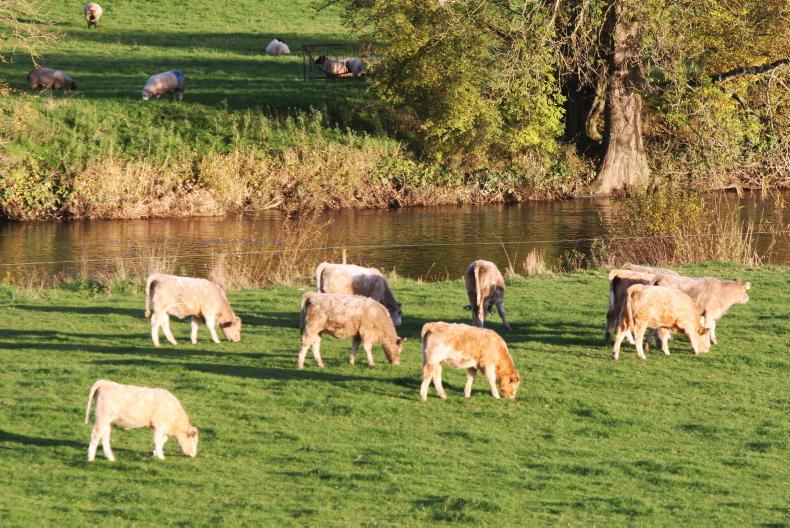Government will provide €60m for a water quality European Innovation Partnership (EIP) scheme for farmers over the next five years, according to the Agricultural Sustainability Support and Advisory Programme (ASSAP).
ASSAP programme manager Noel Meehan said the EIP will provide additional funding for farmers to implement measures to mitigate the impacts of agriculture on water quality.
Meehan made the funding announcement during a presentation on ASSAP’s interim review at a Teagasc Signpost webinar on Friday.
ASSAP provides a free and confidential advisory service to farmers to help them improve water quality.
Progress to date
Speaking to the 300 stakeholders and farmers who joined the webinar, Meehan also said that ASSAP advisers have undertaken a total of 3,143 farm sustainability assessments as of the end of July, resulting in 755 follow-up farm visits. The programme has also held 142 farmer meetings.
Meehan described how, on average, there have been five issues identified per farm and that following engagement, farmers have agreed with 93% of the measures proposed by ASSAP to address these.
On implementing the measures ASSAP has proposed, he said 62% of farmers have started or completed them and 38% of farmers have not started or are not proceeding with them.
He said some farmers are potentially waiting on the roll-out of ACRES, so as to get financial incentive for undertaking the sustainability and water quality preservation measures proposed.

37% of the farms assessd so far by ASSAP advisors have been in beef production.
“It takes time to come back and reassess these farms and see if they've actually started to implement these measures.
"They may be waiting for the new ACRES scheme to come along to avail of some funding there to compensate them for the measures they're going to put in because, as it stands currently, we don't have any money to give to farmers.
“It's pretty much voluntary, what they're doing with their own pocket. That's unfortunate,” he said.
The ASSAP manager said that, to date, Teagasc is funding 20 advisers for the initiative and that while dairy co-operatives are currently funding 16, from an original 10, this is expected to increase to 18 advisers this year.
“That's very important to note, that the co-ops have really acknowledged the role that they have to play in improving water quality,” Meehan said.
Farm breakdown
Of the farms assessed so far by ASSAP advisers, 32% have been dairy, 37% beef, 7% sheep, 4% tillage and 19% mixed.
The most frequent high-risk issues for water quality identified on these farms include phosphorus loss through overland flow, livestock drinking points and stream fencing, buffers and the time of spreading organic manure.
“It's quite consistent what the problems are and we know what they are and what needs to be done to rectify that,” Meehan said.
Read more
Dairy industry should support farmers to meet nitrates targets – Department
Government will provide €60m for a water quality European Innovation Partnership (EIP) scheme for farmers over the next five years, according to the Agricultural Sustainability Support and Advisory Programme (ASSAP).
ASSAP programme manager Noel Meehan said the EIP will provide additional funding for farmers to implement measures to mitigate the impacts of agriculture on water quality.
Meehan made the funding announcement during a presentation on ASSAP’s interim review at a Teagasc Signpost webinar on Friday.
ASSAP provides a free and confidential advisory service to farmers to help them improve water quality.
Progress to date
Speaking to the 300 stakeholders and farmers who joined the webinar, Meehan also said that ASSAP advisers have undertaken a total of 3,143 farm sustainability assessments as of the end of July, resulting in 755 follow-up farm visits. The programme has also held 142 farmer meetings.
Meehan described how, on average, there have been five issues identified per farm and that following engagement, farmers have agreed with 93% of the measures proposed by ASSAP to address these.
On implementing the measures ASSAP has proposed, he said 62% of farmers have started or completed them and 38% of farmers have not started or are not proceeding with them.
He said some farmers are potentially waiting on the roll-out of ACRES, so as to get financial incentive for undertaking the sustainability and water quality preservation measures proposed.

37% of the farms assessd so far by ASSAP advisors have been in beef production.
“It takes time to come back and reassess these farms and see if they've actually started to implement these measures.
"They may be waiting for the new ACRES scheme to come along to avail of some funding there to compensate them for the measures they're going to put in because, as it stands currently, we don't have any money to give to farmers.
“It's pretty much voluntary, what they're doing with their own pocket. That's unfortunate,” he said.
The ASSAP manager said that, to date, Teagasc is funding 20 advisers for the initiative and that while dairy co-operatives are currently funding 16, from an original 10, this is expected to increase to 18 advisers this year.
“That's very important to note, that the co-ops have really acknowledged the role that they have to play in improving water quality,” Meehan said.
Farm breakdown
Of the farms assessed so far by ASSAP advisers, 32% have been dairy, 37% beef, 7% sheep, 4% tillage and 19% mixed.
The most frequent high-risk issues for water quality identified on these farms include phosphorus loss through overland flow, livestock drinking points and stream fencing, buffers and the time of spreading organic manure.
“It's quite consistent what the problems are and we know what they are and what needs to be done to rectify that,” Meehan said.
Read more
Dairy industry should support farmers to meet nitrates targets – Department







 This is a subscriber-only article
This is a subscriber-only article











SHARING OPTIONS: